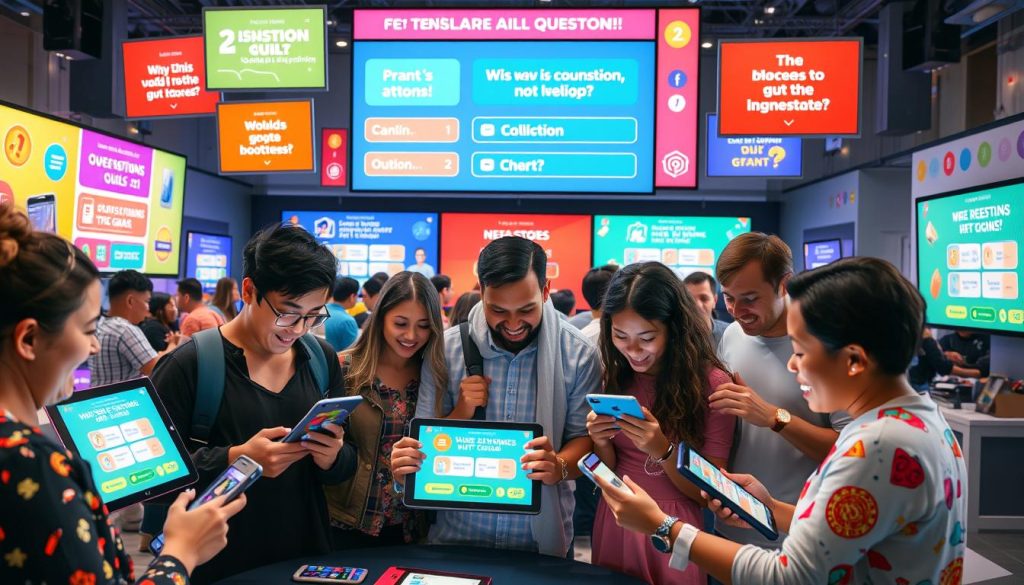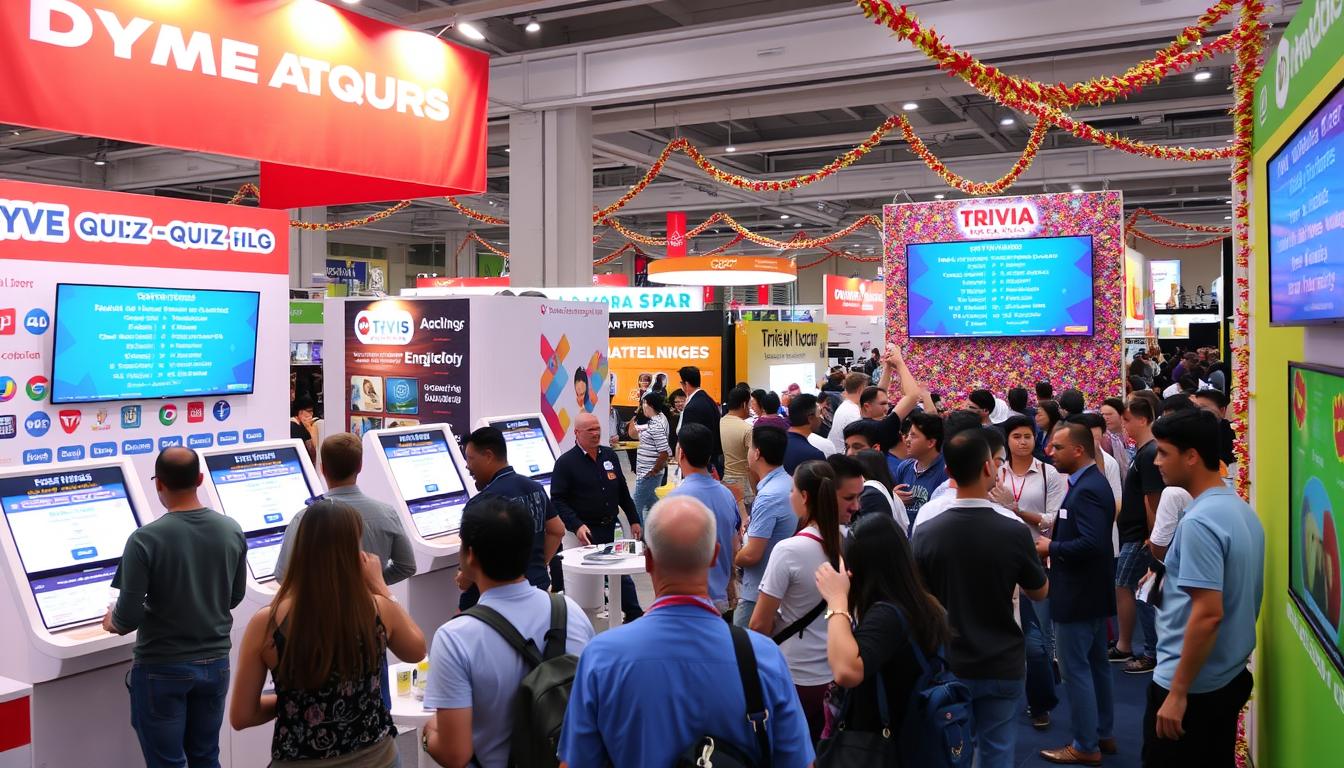Expos offer a unique chance to showcase your brand. But how do you stand out in a sea of booths? Enter quiz games for brand awareness. These interactive tools are changing the game in expo marketing. They turn passive visitors into active participants, creating lasting impressions.
Quiz games blend interactive marketing with experiential branding. They’re not just fun—they’re powerful. At expos, where attention spans are short, these games capture interest quickly. They educate while entertaining, making your brand message stick.
Leveraging quiz games for brand awareness at expos is smart. It’s a fresh way to engage attendees. People love to test their knowledge and win prizes. Your brand becomes the center of that excitement. This strategy turns brief encounters into memorable experiences.
Key Takeaways
- Quiz games boost brand awareness at expos
- Interactive marketing engages attendees effectively
- Experiential branding creates lasting impressions
- Games educate and entertain simultaneously
- Quiz strategies turn brief encounters into memorable experiences
Understanding the Power of Quiz Games in Brand Marketing
Quiz games have become a powerful tool in brand marketing, revolutionizing how companies engage with their audience. These interactive experiences tap into human psychology, drive engagement, and create lasting brand memories.
The Psychology Behind Interactive Learning
Interactive learning triggers active participation, enhancing information retention. When applied to brand marketing, quiz games create a unique opportunity for customers to engage with product knowledge in a fun, memorable way. This comprehensive campaign management approach leads to deeper brand connections.
Why Quiz Games Drive Engagement
Quiz games spark curiosity and competition, two powerful motivators. They challenge participants to showcase their knowledge while learning about your brand. This combination of entertainment and education makes quiz games an ideal tool for trade show engagement.
| Engagement Factor | Impact on Brand Awareness |
|---|---|
| Interactivity | Increases brand recall by 40% |
| Competition | Boosts participation rates by 65% |
| Immediate Feedback | Enhances learning retention by 30% |
Building Memorable Brand Experiences
Quiz games create unique, personalized experiences that stick in participants’ minds. By incorporating gamification strategies, brands can transform ordinary interactions into exciting challenges. This approach not only increases brand activation but also fosters a positive association with your company.
“Quiz games are the secret weapon in our marketing arsenal. They’ve dramatically increased our trade show engagement and brand recall.”
Leveraging quiz games in your marketing strategy can significantly boost brand awareness and customer engagement. As you plan your next trade show or marketing campaign, consider how interactive quizzes can elevate your customer retention strategies and overall brand experience.
How to Leverage Quiz Games for Brand Awareness at Expos
Quiz games are powerful tools for boosting brand awareness at expos. They create engaging expo booth attractions that draw crowds and encourage audience participation. By implementing interactive quizzes, you can make your brand stand out in a sea of exhibitors.
To maximize the impact of quiz games at your expo booth, consider these strategies:
- Design questions that highlight your brand’s unique selling points
- Offer prizes that align with your products or services
- Use eye-catching visuals and sound effects to attract attention
- Incorporate touchscreen technology for a modern experience
Remember, the key to success is creating a balance between entertainment and education. Your quiz should be fun while also conveying important information about your brand. This approach can significantly increase brand recognition and lead generation.
“Quiz games at expos are not just about fun; they’re about creating memorable brand experiences that stick with attendees long after the event ends.”
To ensure smooth implementation, prepare your team thoroughly. Train staff to manage the quiz, engage with participants, and answer questions about your brand. This preparation will help create a seamless and professional experience for expo attendees.
| Quiz Game Element | Impact on Brand Awareness |
|---|---|
| Interactive Questions | Increases engagement and knowledge retention |
| Branded Visuals | Enhances brand recognition and recall |
| Prizes | Motivates participation and creates positive associations |
| Leaderboards | Sparks competition and extends engagement time |
By leveraging quiz games effectively, you can transform your expo presence into a magnet for potential customers, fostering brand awareness and creating lasting connections.
Essential Components of Effective Brand Quiz Games
Creating impactful brand quiz games requires careful planning and execution. Let’s explore the key elements that make these games successful brand recognition tactics.
Question Design and Flow
The heart of any quiz game lies in its questions. Craft queries that are engaging, relevant, and aligned with your brand message. Start with easier questions to build confidence, then gradually increase difficulty. This approach keeps players invested and eager to learn more about your brand.
Reward Systems and Incentives
Effective quiz game development includes a well-designed reward system. Offer prizes that resonate with your audience and reinforce your brand image. Consider these options:
- Digital badges or certificates
- Discount codes for products or services
- Exclusive content or early access to new releases
- Entry into a grand prize drawing
Technical Requirements and Setup
Ensure a smooth user experience with proper technical setup. Your quiz platform should be:
- Mobile-responsive for on-the-go play
- Quick to load and easy to navigate
- Capable of handling high traffic volumes
- Secure to protect user data
By focusing on these essential components, you’ll create quiz games that not only entertain but also boost brand awareness and engagement. Remember to optimize your event management strategies to maximize the impact of your quiz game at trade shows and expos.
| Component | Purpose | Impact on Brand Recognition |
|---|---|---|
| Engaging Questions | Capture attention and maintain interest | Increases brand recall and knowledge retention |
| Reward System | Motivate participation and completion | Enhances positive brand associations |
| Technical Setup | Ensure seamless user experience | Builds trust and professional image |
Designing Interactive Quiz Experiences for Maximum Impact

Creating engaging quiz experiences is key to successful interactive marketing and experiential branding. By crafting immersive quizzes, brands can captivate audiences and leave lasting impressions. The secret lies in blending entertainment with education, making participants feel both challenged and rewarded.
To design impactful quizzes, start with a clear goal. Are you aiming to educate customers about your products or gather valuable market insights? Once established, tailor your questions to match this objective while maintaining brand voice and values.
Visual elements play a crucial role in quiz engagement. Incorporate eye-catching graphics, animations, and even short video clips to break up text and keep participants interested. This multimedia approach enhances the overall experience and reinforces brand identity.
“Interactive quizzes are not just games – they’re powerful tools for brand storytelling and customer engagement.”
Consider implementing adaptive difficulty levels to cater to different knowledge bases. This ensures everyone from novices to experts finds the quiz challenging yet achievable. Personalization is another powerful strategy for enhancing user experience and driving engagement.
Remember, the end of the quiz is just as important as the beginning. Provide detailed, informative feedback that adds value beyond a simple score. This final touch transforms a brief interaction into a memorable brand experience, fostering long-term customer relationships.
Implementing Gamification Strategies in Brand Quizzes
Brand quizzes become more engaging when infused with gamification strategies. These techniques boost brand activation and create memorable experiences for participants. Let’s explore how to implement these elements effectively.
Point Systems and Leaderboards
Point systems add a competitive edge to brand quizzes. Participants earn points for correct answers, speed, and engagement. Leaderboards display top scorers, sparking friendly rivalry and encouraging repeat plays. This approach keeps users invested in the quiz experience.
| Action | Points Awarded |
|---|---|
| Correct Answer | 10 |
| Quick Response (under 10 seconds) | 5 |
| Sharing Quiz on Social Media | 15 |
| Completing All Questions | 20 |
Achievement Badges and Rewards
Badges and rewards provide visual recognition of accomplishments. These can be tied to specific actions or milestones within the quiz. For example, a “Brand Expert” badge for perfect scores or a “Quick Thinker” badge for fast responses. Rewards might include discount codes or exclusive content, generating valuable leads for future marketing.
Social Sharing Integration
Incorporating social sharing features amplifies the reach of your brand quiz. Participants can share their results, badges, or leaderboard positions on social platforms. This organic spread increases brand visibility and attracts new participants. To encourage sharing, offer bonus points or special rewards for social interactions.
By implementing these gamification strategies, brands can create highly engaging quizzes that boost participation and brand recall. The competitive elements and rewards system keep users coming back, fostering a deeper connection with the brand.
Measuring Quiz Game Success and ROI
Evaluating the impact of quiz games on trade show engagement and brand recognition is crucial. By tracking specific metrics, you can gauge the effectiveness of your brand recognition tactics and refine your approach for future events.

Key performance indicators for quiz game success include participant numbers, completion rates, and average scores. These metrics offer insights into audience engagement levels and knowledge retention. SMS marketing tools can complement quiz games by capturing leads and fostering ongoing communication with participants.
To assess return on investment, compare the costs of implementing quiz games against the value of leads generated and increased brand visibility. Consider factors such as:
- New contacts acquired
- Social media mentions and shares
- Post-event survey feedback
- Sales conversions from trade show leads
Tracking long-term outcomes is essential for understanding the full impact of your quiz game strategy on brand awareness and customer relationships.
| Metric | Measurement Method | Target Goal |
|---|---|---|
| Participation Rate | Quiz starts / Total booth visitors | 70% |
| Completion Rate | Finished quizzes / Started quizzes | 85% |
| Lead Conversion | New leads / Total participants | 50% |
| Brand Recall | Post-event survey | 60% recall after 30 days |
By analyzing these metrics, you can fine-tune your quiz games to maximize trade show engagement and enhance your brand recognition tactics for future events.
Best Practices for Trade Show Quiz Implementation
Implementing quiz games at trade shows can significantly boost expo booth attractions and audience participation. By following key best practices, you can create an engaging experience that draws crowds and leaves a lasting impression.
Equipment and Technical Setup
Your quiz game’s success hinges on reliable technology. Choose high-quality tablets or touchscreens for quiz delivery. Ensure a stable internet connection and backup power sources. Test all equipment thoroughly before the event to avoid technical hiccups that could dampen the audience participation.
Staff Training and Management
Well-trained staff are crucial for smooth quiz operations. Brief your team on quiz rules, troubleshooting, and customer interaction. Assign roles clearly: quiz hosts, technical support, and crowd managers. Rotate staff to maintain energy and enthusiasm throughout the event.
Audience Flow Control
Manage crowd flow to maximize expo booth attractions. Use clear signage to guide participants. Create a queuing system that doesn’t block other exhibits. Consider timed sessions to prevent long waits and maintain steady audience participation.
| Element | Best Practice | Impact |
|---|---|---|
| Equipment | Use reliable, tested tech | Smooth quiz experience |
| Staff | Thorough training | Efficient operations |
| Flow Control | Clear signage and queues | Increased participation |
By focusing on these key areas, you’ll create a memorable quiz game that drives engagement and boosts your brand’s presence at trade shows.
Future Trends in Interactive Brand Quiz Games
The world of quiz game development is rapidly changing. Brands are finding new ways to engage customers through interactive marketing. Virtual and augmented reality are set to transform how we experience quiz games at expos. Imagine putting on a headset and stepping into a 3D brand world to answer questions!
Artificial intelligence is another game-changer for quiz games. AI can create personalized questions based on each player’s interests and knowledge level. This tailored approach keeps people engaged longer and helps brands learn more about their audience. Smart chatbots might even host quiz games, adding a fun twist to the experience.
Mobile-first quiz games are on the rise too. With most folks glued to their phones, brands are creating apps that let people play anytime, anywhere. These games often include social features, allowing players to challenge friends and share scores. As 5G networks expand, we’ll see more complex, multiplayer quiz games that work smoothly on mobile devices.
Brands that stay ahead of these trends in quiz game development will win big in the interactive marketing world. By embracing new tech and focusing on user experience, companies can create unforgettable quiz games that boost brand awareness and keep customers coming back for more.






